With his government facing scathing criticism over multiple scams, Prime Minister Manmohan Singh on Monday promised a strong Lokpal to end corruption and asserted that hunger strikes will not help address the problem, in an apparent reference to Anna Hazare's agitation.
Addressing the nation for the eighth consecutive year on the occasion of Independence Day, Dr Singh said no government has a "magic wand" to deal with the problem of corruption which needs to be tackled on many fronts. He asked all political parties to "stand shoulder to shoulder" in this fight.
A day before Hazare is scheduled to embark on an indefinite fast for a strong Lokpal, he made it clear that only Parliament can decide what type of Lokpal legislation can be enacted.
"I am aware of the differences of opinion on some aspects of the bill. Those who don't agree with this bill can put forward their views to Parliament, political parties and even the press. However, I also believe they should not resort to hunger strikes and fasts-unto-death," Dr Singh said.
'Many instances of corruption have come to light'
Image: A BJP activist wears a mask depicting Prime Minister Manmohan Singh during an anti-government protestPhotographs: Parivartan Sharma/Reuters
Acknowledging that corruption is a major obstacle in national transformation, he said the menace should be discussed in a manner that should not create an atmosphere in which the country's progress is questioned.
He also admitted that funds meant for the welfare of common man end up in the pockets of government officials.
Speaking from a bullet-proof enclosure amid rains, the prime minister touched on a variety of subjects including the sensitive land acquisition issue, Naxalism, terrorism, economy and inflation.
Unlike in the past, foreign policy issues found no mention in his 40-minute speech on the 65th Independence Day from the historic 17th century Mughal monument of Red Fort.
Dr Singh, who devoted a major part of the speech on corruption, admitted that the scourge was a "big obstacle" in the way of transformation of the country as a major economic power globally.
"In the last few months, many instances of corruption have come to light. In some cases, functionaries of the central government face allegations of corruption. In other cases, it is the functionaries of various state governments," he said.
'We are taking the strictest possible action in cases of corruption'
Image: Prime Minister Manmohan Singh addresses the nation from the ramparts of Red FortWith a number of corruption cases pending before different courts, the prime minister chose not to comment on specific scams like 2G, Commonwealth Games and Adarsh.
"We are taking the strictest possible action in cases of corruption that have surfaced. I will say nothing more on this subject as these cases are sub-judice," he said.
"Any debate on these matters should reflect the confidence that we can overcome these challenges," Dr Singh said.
"Corruption manifests itself in many forms. In some instances, funds meant for schemes for the welfare of the common man end up in the pocket of government officials. In some other instances government discretion is used to favour a selected few. There are also cases where government contracts are wrongfully awarded to the wrong people," he said, asserting that the government cannot let such activities continue unchecked.
Noting that the government was keen on a "strong" Lokpal to prevent corruption in high places, Dr Singh said, "We have recently introduced a Bill in Parliament to achieve this. Now only Parliament can decide what type of Lokpal legislation should be enacted."
'Quick action will be taken against the corrupt'
Image: Prime Minister Manmohan Singh addresses the nation from the ramparts of Red FortThe prime minister said he believed that there was "no single big step" which could be taken on corruption.
"In fact, we will have to act simultaneously on many fronts," he said.
Sending out a strong message to those indulging in scams, he said, "Everyone should know that quick action will be taken against the corrupt and punishment should be meted out to them."
At the same time, Dr Singh said, "If our system delivers justice in an effective manner, government officials would think twice before committing a wrong act out of greed or under political pressure."
On Team Anna's demand for bringing higher judiciary in the purview of Lokpal, he said it was "not appropriate" as "we believe that any such provision would go against the independence of the judiciary".
He admitted that there was a need for a "framework in which the judiciary becomes more accountable. It is with this aim that we have introduced the Judicial Accountability Bill in Parliament."
Dr Singh expressed confidence that this Bill will be passed soon.
'There are frequent complaints of corruption'
Image: Prime Minister Manmohan Singh inspects the Guard of Honour at Red FortBut he did not touch upon the question of whether the prime minister should come under the ambit of the Lokpal, a consistent demand by Team Anna and some political parties.
Admitting that government discretion was "misused in the allocation of scarce resources and in the grant of clearances", Dr Singh said they will put an end to such discretionary powers wherever possible and he hopes to enact a public procurement legislation by the end of this year.
"Any government awards contracts worth thousands of crores every year. There are frequent complaints of corruption in these decisions. We had constituted a committee to suggest measures to reduce corruption in government purchases. The committee has recommended that, like many other countries, we should also have a public procurement legislation which lays down the principles and practice with regard to government purchases. We will introduce a Bill in Parliament by the end of this year to enact such a law," he said.
The prime minister said the government was also planning to enact a law which enables the monitoring of the work of regulatory authorities and makes them more accountable without compromising their independence.
'The Indian press is known for its independence'
Image: Prime Minister Manmohan Singh pays floral tributes at the 'samadhi' of Mahatma Gandhi at RajghatHighlighting the role of RTI in keeping a "strict watch" on the work of the government, he said, "Today, many government decisions, which in the absence of this Act would escape public scrutiny, are coming to light. I believe that this is a big step forward in eradicating corruption."
Dr Singh noted that an alert press and an aware citizenry can be very helpful in the fight against corruption.
"The Indian press is known for its independence and activism throughout the world. The RTI legislation that we have enacted has enabled our press and people to keep a strict watch on the work of the government," he said.
Noting that much has been achieved during his last seven years in office, Dr Singh admitted that a lot remains to be done.
"The road ahead is long and arduous. Particularly, the prevailing situation both inside and outside the country is such that if we do not act with understanding and restraint, our security and prosperity can get adversely affected," he said.
'Our farmers have been especially affected'
Image: Villagers hold placards during a protest against land acquisition in Orissa"There are some people who want to create disturbances in the country so that our progress gets stalled. All this can have a negative impact on us. But we will not let this happen," he asserted.
The prime minister also spoke about the problems surrounding the procurement of land and promised the enactment of a "forward looking and balanced" law to prevent tension over the sensitive issue.
Emphasising that he was fully aware of the tensions caused in some parts of the country because of the acquisition of land for industry, infrastructure and urbanisation, he said that the government will ensure that "no injustice is done to anyone in the process of land acquisition."
He said, "Our farmers have been especially affected by such acquisition. Land acquisition is no doubt necessary for projects of public interest. But it should take place in a transparent and fair manner. The interests of those whose livelihoods are dependent on the land being acquired should be fully protected."
Dr Singh said that the government wants to replace the 117-year-old land acquisition law by a new Land Acquisition and Rehabilitation law which is forward looking and balanced.
'There can't be any slip-up in our vigilance'
Image: A file photo of the Mumbai serial blasts"We have already prepared a draft legislation and have initiated steps to build consensus on it. We will soon introduce a Bill in Parliament to this end," he said.
Touching upon the issue of terrorism, Dr Singh said the recent serial blasts in Mumbai have come as a warning to the nation that there cannot be any laxity in the vigil against the scourge.
"Last month's terrorist attacks in Mumbai warn us that there cannot be any slip-up in our vigilance as far as the fight against terrorism is concerned. This is a long battle to be fought jointly by the central government, state governments and the common man," he said.
The prime minister said the government has been steadily strengthening intelligence and security agencies and will continue to do so in the future.
He also expressed concern over the issue of Naxalism, which he had earlier described as the biggest threat to internal security.
'We want to eradicate the very reasons for Naxalism'
Image: Prime Minister Manmohan Singh, surrounded by his bodyguards, briefs the media"We are also taking all possible steps to overcome the challenge of Naxalism. We want to eradicate the very reasons which give rise to this problem," he said.
Dr Singh stated that a new scheme has been started for the accelerated development of 60 backward and tribal-dominated districts and an amount of Rs 3,300 crore will be spent on the scheme in a period of two years.
Noting that vocational education and skill development have acquired new importance, Dr Singh also announced that the government will appoint an Education Commission to make recommendations for improvements at all levels of education in the country.
"In view of these major changes, it is necessary that we consider all aspects of education in a comprehensive manner. Therefore we have decided to appoint an education commission to make recommendations for improvements at all levels of education," he said.
Expressing satisfaction over achievements in the education sector, Dr Singh said the government was considering universalisation of secondary education as it did in the case of elementary education through the Right to Education Act.
'Every citizen has a right to elementary education'
"Today, every citizen has a right to elementary education. We are now considering universalisation of secondary education," he said.
Noting that the government put its emphasise on education in the 11th Five Year Plan, Dr Singh said similar priority will be given to the health sector in the 12th Five Year Plan.
"I have often referred to the 11th Five Year Plan as an education plan. We will lay the same emphasis on health in the 12th plan as we laid on education in the 11th plan," he said.
Holding that health insurance for workers in the unorganised sector was a priority, he said the government will endeavour to cover as many workers as possible under the Rashtriya Swasthya Bima Yojana, which was introduced in 2008.
'The pace of our progress shouldn't get affected'
Image: Prime Minister Manmohan Singh at the Saluting Dias at the Guard of Honour ceremony at Red FortDr Singh also referred to the threat posed by climate change to development processes.
He said the government has established eight missions on climate change and is working hard to implement these missions.
"In the coming months, we will constitute an environmental assessment and monitoring authority to streamline the process of environmental clearances," Dr Singh said.
He spoke about tensions that some times arise in the process of change, saying it was natural.
"In a democracy, such tensions also become issues of political polarisation. We should endeavour that even as political parties oppose and engage in debate against each other, the pace of our progress does not get affected," he said.

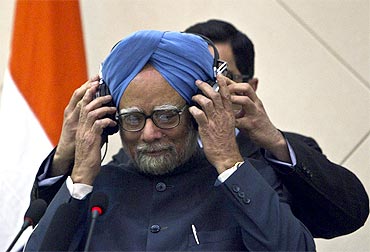
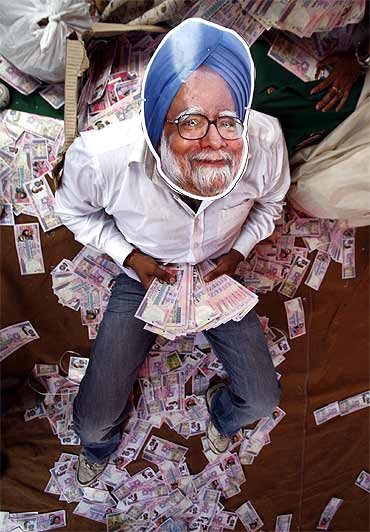
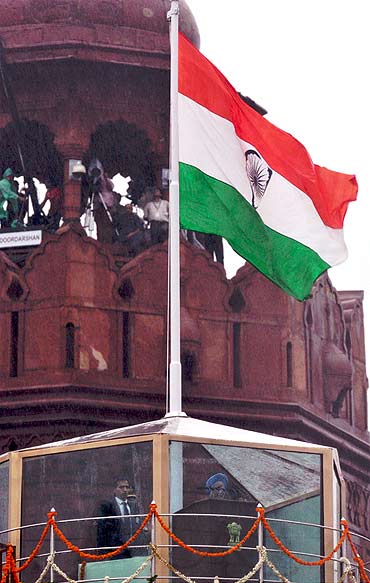
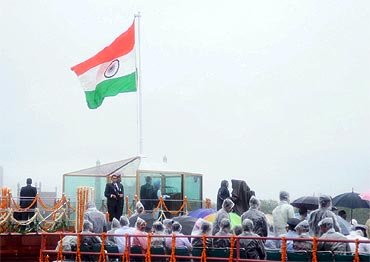
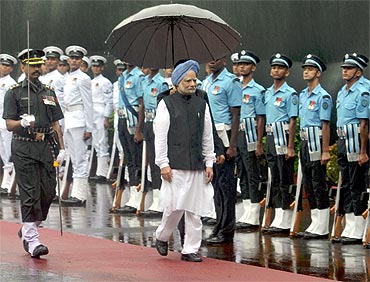
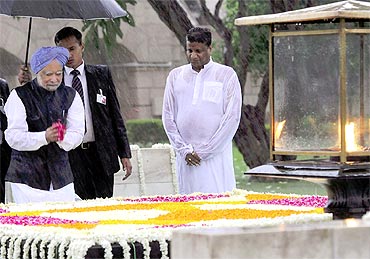
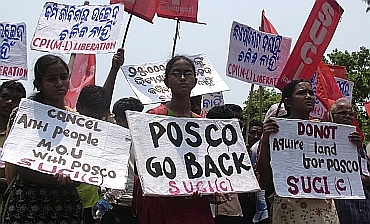
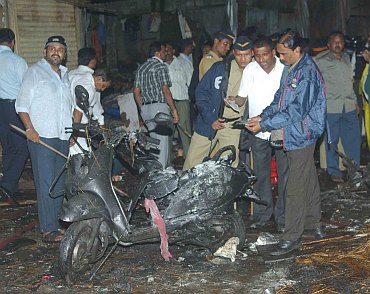
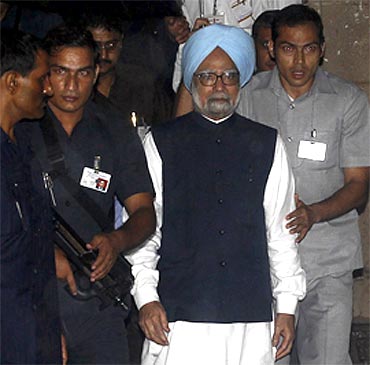
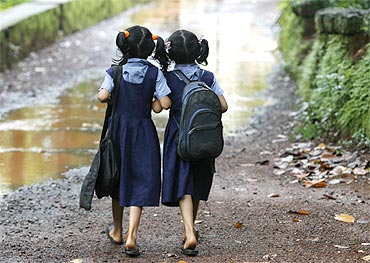
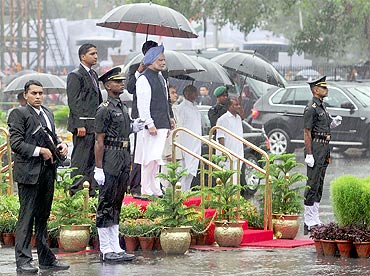
article